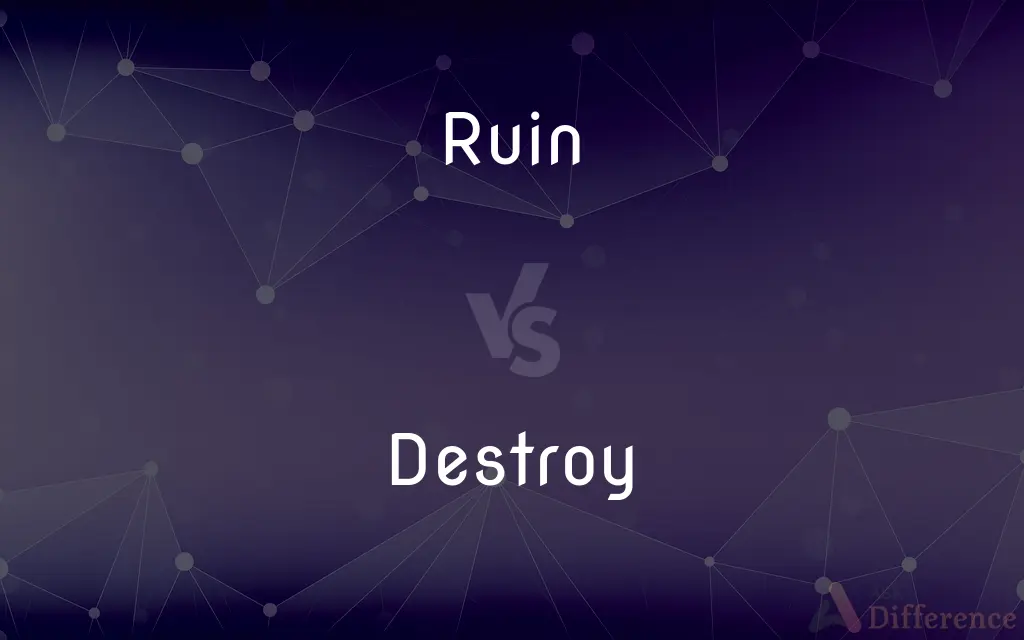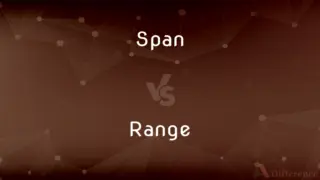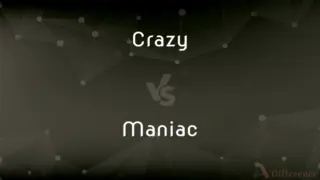Ruin vs. Destroy — What's the Difference?
Edited by Tayyaba Rehman — By Urooj Arif — Updated on April 8, 2024
Ruin refers to severely damaging something, reducing its value or function, while destroy means to completely eliminate its existence or utility.

Difference Between Ruin and Destroy
Table of Contents
ADVERTISEMENT
Key Differences
Ruin implies a state where something is still recognizable but has lost its original value, function, or beauty. It suggests partial damage that leaves remnants behind, which can sometimes be restored. For example, a building can be in ruins after a natural disaster, still standing but unsafe for use. In contrast, to destroy something means to eliminate it entirely or cause so much damage that it cannot be recognized or restored to its original state. Destruction often leaves nothing salvageable, as in the case of a building being demolished to make way for new construction.
The process of ruining something can be gradual, such as a house becoming uninhabitable over years of neglect. It indicates a decline that might be reversible with effort and resources. Conversely, destruction is usually a more immediate and irreversible action, often intentional and complete, leaving no hope for recovery. This difference highlights ruin as a process and destroy as an outcome.
In literature and metaphorical uses, ruin often conveys a sense of loss and decay that may not be physical, such as the ruin of a person's reputation or career. This usage emphasizes the lingering effects and potential for the remains to tell a story or serve as a warning. Destroy, however, suggests a more definitive end, leaving no trace or opportunity for redemption, as in the destruction of evidence or the complete dismantling of an organization.
The emotional connotations of ruin and destroy also differ. Ruin often carries a sense of sadness and nostalgia for what was lost, recognizing the remnants of beauty or utility. Destroy evokes a stronger response, suggesting aggression, finality, and sometimes a sense of justice or retribution, depending on the context.
In the context of relationships or abstract concepts, to ruin something like a friendship might mean causing significant harm that drastically changes its nature or dynamics, possibly leaving room for repair. To destroy a relationship, however, implies an end to its very existence, leaving no chance for mending or reconciliation.
ADVERTISEMENT
Comparison Chart
Definition
Severely damage, reducing value/function.
Eliminate existence/utility entirely.
Result
Partial damage, remnants may remain.
Complete eradication, nothing left.
Reversibility
Often reversible with effort/resources.
Typically irreversible.
Process
Can be gradual, due to neglect/decay.
Immediate, often due to intentional act.
Connotations
Sadness, loss, potential for restoration.
Finality, aggression, end of existence.
Compare with Definitions
Ruin
Involves a reduction in value or utility.
A single mistake ruined the whole project.
Destroy
Can refer to ending the existence of abstract concepts.
Lies can destroy trust in a relationship.
Ruin
Can refer to financial or moral downfall.
Scandal ruined the politician's career.
Destroy
To completely obliterate or demolish.
The fire destroyed the warehouse completely.
Ruin
Often implies decay or decline.
The mansion fell into ruin over the decades.
Destroy
Implies total elimination or annihilation.
The invasive species destroyed the local ecosystem.
Ruin
May still retain some form or function.
The ancient ruins attract tourists worldwide.
Destroy
Often used in contexts of conflict or disaster.
The hurricane destroyed many homes in its path.
Ruin
To severely damage or spoil something.
The flood ruined the farmer's crops.
Destroy
Leaves no opportunity for restoration or recovery.
The evidence was destroyed to prevent prosecution.
Ruin
The state of being physically destroyed, collapsed, or decayed
The castle fell into ruin.
Destroy
To break apart the structure of, render physically unusable, or cause to cease to exist as a distinguishable physical entity
The fire destroyed the library. The tumor was destroyed with a laser.
Ruin
The state of being extensively harmed or damaged
Our vacation plans are in ruins.
Destroy
To put an end to; eliminate
“In crowded populations, poverty destroys the possibility of cleanliness” (George Bernard Shaw).
Ruin
Poverty of bankruptcy
Their decision brought the bank to ruin.
Destroy
To render useless or ruin
Felt that an overemphasis on theory had destroyed the study of literature.
Ruin
Often ruins A destroyed, collapsed, or decayed building or other physical entity
The ruins of the old mill.
Destroy
To put to death; kill
Destroy a rabid dog.
Ruin
One that has been extensively damaged or harmed
He is a ruin of his former self.
Destroy
To subdue or defeat completely; crush
The rebel forces were destroyed in battle.
Ruin
A cause of destruction or irreparable harm or loss
Gambling will be his ruin.
Destroy
To cause emotional trauma to; devastate
The divorce destroyed him.
Ruin
To cause (a building, for example) to be in a destroyed, collapsed, or decayed state.
Destroy
To be destructive; cause destruction
“Too much money destroys as surely as too little” (John Simon).
Ruin
To harm or damage the quality or value of (something) irreparably
A bad diet ruined his health.
Destroy
(ambitransitive) To damage beyond use or repair.
The earthquake destroyed several apartment complexes.
Hooligans destroy unprovoked.
Ruin
To harm or damage the enjoyment or experience of (something) greatly
Ruined the movie by talking throughout it.
Ruined the book by giving away the ending.
Destroy
(transitive) To neutralize, undo a property or condition.
Smoking destroys the natural subtlety of the palate.
Ruin
To reduce to poverty or bankruptcy
Bad loans ruined the banker.
Destroy
(transitive) To put down or euthanize.
Destroying a rabid dog is required by law.
Ruin
The remains of a destroyed or dilapidated construction, such as a house or castle.
Destroy
(transitive) To severely disrupt the well-being of (a person); ruin.
Her divorce destroyed her; she had a nervous breakdown and was severely depressed for more than a year.
Ruin
(uncountable) The state of being a ruin, destroyed or decayed.
The monastery has fallen into ruin.
Destroy
To defeat soundly.
Ruin
(uncountable) Something that leads to serious trouble or destruction.
Gambling has been the ruin of many.
Destroy
To remove data.
The memory leak happened because we forgot to destroy the temporary lists.
Ruin
The act of ruining something.
Destroy
To sing a song poorly.
Ruin
(obsolete) A fall or tumble.
Destroy
To exhaust duly and thus recreate or build up.
This exercise is going to destroy all parts of your shoulders.
Ruin
A change that destroys or defeats something; destruction; overthrow.
The ruin of a ship or an army;
The ruin of a constitution or a government;
The ruin of health or hopes
Destroy
To unbuild; to pull or tear down; to separate virulently into its constituent parts; to break up the structure and organic existence of; to demolish.
But ye shall destroy their altars, break their images, and cut down their groves.
Ruin
(uncountable) Complete financial loss; bankruptcy.
Destroy
To ruin; to bring to naught; to put an end to; to annihilate; to consume.
I will utterly pluck up and destroy that nation.
Ruin
(transitive) To cause the fiscal ruin of; to bankrupt or drive out of business.
With all these purchases, you surely mean to ruin us!
Destroy
To put an end to the existence, prosperity, or beauty of; to kill.
If him by force he can destroy, or, worse,By some false guile pervert.
Ruin
To destroy or make something no longer usable.
He ruined his new white slacks by accidentally spilling oil on them.
Destroy
Do away with, cause the destruction or undoing of;
The fire destroyed the house
Ruin
To upset or overturn the plans or progress of, or to have a disastrous effect on something.
My car breaking down just as I was on the road ruined my vacation.
Destroy
Destroy completely; damage irreparably;
You have ruined my car by pouring sugar in the tank!
The tears ruined her make-up
Ruin
To make something less enjoyable or likeable.
I used to love that song, but being assaulted when that song was playing ruined the song for me.
Destroy
Defeat soundly;
The home team demolished the visitors
Ruin
To reveal the ending of (a story); to spoil.
Destroy
As of animals;
The customs agents destroyed the dog that was found to be rabid
Ruin
(obsolete) To fall into a state of decay.
Ruin
To seduce or debauch, and thus harm the social standing of.
The young libertine was notorious for ruining local girls.
Ruin
The act of falling or tumbling down; fall.
Ruin
Such a change of anything as destroys it, or entirely defeats its object, or unfits it for use; destruction; overthrow; as, the ruin of a ship or an army; the ruin of a constitution or a government; the ruin of health or hopes.
Ruin
That which is fallen down and become worthless from injury or decay; as, his mind is a ruin; especially, in the plural, the remains of a destroyed, dilapidated, or desolate house, fortress, city, or the like.
The Veian and the Gabian towers shall fall,And one promiscuous ruin cover all;Nor, after length of years, a stone betrayThe place where once the very ruins lay.
The labor of a day will not build up a virtuous habit on the ruins of an old and vicious character.
Ruin
The state of being dcayed, or of having become ruined or worthless; as, to be in ruins; to go to ruin.
Ruin
That which promotes injury, decay, or destruction.
The errors of young men are the ruin of business.
Ruin
To bring to ruin; to cause to fall to pieces and decay; to make to perish; to bring to destruction; to bring to poverty or bankruptcy; to impair seriously; to damage essentially; to overthrow.
This mortal house I'll ruin.
By thee raised, I ruin all my foes.
The eyes of other people are the eyes that ruin us.
By the fireside there are old men seated,Seeling ruined cities in the ashes.
Ruin
To fall to ruins; to go to ruin; to become decayed or dilapidated; to perish.
Though he his house of polished marble build,Yet shall it ruin like the moth's frail cell.
If we are idle, and disturb the industrious in their business, we shall ruin the faster.
Ruin
An irrecoverable state of devastation and destruction;
You have brought ruin on this entire family
Ruin
A ruined building;
They explored several Roman ruins
Ruin
The process of becoming dilapidated
Ruin
An event that results in destruction
Ruin
Failure that results in a loss of position or reputation
Ruin
Destruction achieved by wrecking something
Ruin
Destroy completely; damage irreparably;
You have ruined my car by pouring sugar in the tank!
The tears ruined her make-up
Ruin
Destroy or cause to fail;
This behavior will ruin your chances of winning the election
Ruin
Reduce to bankruptcy;
My daughter's fancy wedding is going to break me!
The slump in the financial markets smashed him
Ruin
Reduce to ruins;
The country lay ruined after the war
Ruin
Deprive of virginity;
This dirty old man deflowered several young girls in the village
Ruin
Fall into ruin
Common Curiosities
Is it possible to recover something that has been ruined?
Often, yes, with effort and resources, something ruined can be restored, unlike something destroyed.
Can abstract concepts like trust be both ruined and destroyed?
Yes, trust can be ruined by breaches, leaving room for repair, or destroyed completely, leaving no chance for restoration.
Are ruin and destroy interchangeable in legal contexts?
In legal language, the terms are not interchangeable; the specificity of the damage or loss often requires the precise use of one term over the other.
Can cities or civilizations be ruined and destroyed?
Yes, cities or civilizations can be ruined, leaving behind remnants for study or tourism, or destroyed, leaving little to no trace.
What is the key difference between ruin and destroy?
Ruin implies severe damage with remnants left behind, possibly reversible, while destroy means complete elimination with no remnants.
Can something be ruined and then destroyed?
Yes, an object or concept can first be ruined (severely damaged) and later destroyed (completely eradicated).
Does the process of ruin require human action?
Not necessarily; ruin can result from natural processes like decay, whereas destruction often involves human action.
What does it mean to ruin someone's reputation?
It means causing significant harm to how others perceive that person, though not necessarily making it irreparable.
How do ruin and destroy differ in emotional impact?
Ruin often evokes sadness and nostalgia for what was lost, while destroy suggests a more definitive end and can evoke a sense of finality or aggression.
How does the intention behind ruin and destroy differ?
Ruining something might not always be intentional and can result from neglect, while destroying often involves a deliberate act.
How do ruin and destroy relate to environmental contexts?
Ruin can refer to damage to ecosystems that may be reversible, while destroy indicates irreversible harm or complete loss of ecosystems.
Is the concept of ruin more subjective than destroy?
Yes, what constitutes ruin can be more subjective and dependent on perspective, while destruction is more definitive and objective.
In literature, how are ruin and destroy used differently?
Ruin is often used metaphorically to describe a fall from grace or decline, while destroy can symbolize a complete and final end.
How does one decide whether to use ruin or destroy in writing?
The choice depends on the extent of damage and the finality of the situation; ruin suggests damage but with remnants left, destroy implies complete eradication.
Can the process of ruin be halted or reversed?
Yes, with timely intervention and adequate resources, the process of ruin can often be halted or reversed, unlike destruction.
Share Your Discovery

Previous Comparison
Span vs. Range
Next Comparison
Crazy vs. ManiacAuthor Spotlight
Written by
Urooj ArifUrooj is a skilled content writer at Ask Difference, known for her exceptional ability to simplify complex topics into engaging and informative content. With a passion for research and a flair for clear, concise writing, she consistently delivers articles that resonate with our diverse audience.
Edited by
Tayyaba RehmanTayyaba Rehman is a distinguished writer, currently serving as a primary contributor to askdifference.com. As a researcher in semantics and etymology, Tayyaba's passion for the complexity of languages and their distinctions has found a perfect home on the platform. Tayyaba delves into the intricacies of language, distinguishing between commonly confused words and phrases, thereby providing clarity for readers worldwide.














































